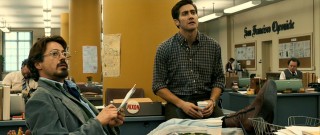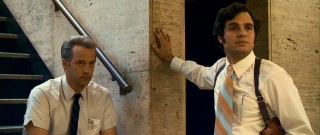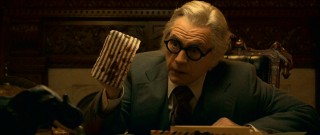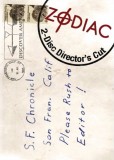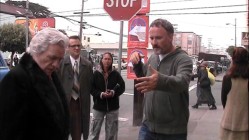Zodiac: 2-Disc Director's Cut DVD Review
 |
Zodiac
Theatrical Release: March 2, 2007 / Running Time: 162 Minutes (Director's Cut) / Rating: R Director: David Fincher / Writers: James Vanderbilt (screenplay), Robert Graysmith (books) Cast: Jake Gyllenhaal (Robert Graysmith), Mark Ruffalo (Inspector David Toschi), Robert Downey Jr. (Paul Avery), Anthony Edwards (Inspector William Armstrong), Brian Cox (Melvin Belli), Charles Fleischer (Bob Vaughn), Zach Grenier (Mel Nicolai), Philip Baker Hall (Sherwood Morrill), Elias Koteas (Sgt. Jack Mulanax), James Le Gros (Detective George Bawart), Donal Logue (Ken Narlow), John Carroll Lynch (Arthur Leigh Allen), Dermot Mulroney (Captain Marty Lee), Chloλ Sevigny (Melanie), John Getz (Templeton Peck), John Terry (Charles Theiriot), Candy Clark (Carol Fisher), June Raphael (Mrs. Toschi), Ciara Hughes (Darlene Ferrin), Lee Norris (Mike Mageau - Young), Ed Setrakian (Al Hyman), Jimmi Simpson (Mike Mageau), Adam Goldberg (Duffy Jennings), Patrick Scott Lewis (Bryan Hartnell), Pell James (Cecilia Shepard), Matt Winston (John Allen), Jules Bruff (Catherine Allen), Clea DuVall (Linda del Buono), Zachary Sauers (Aaron Graysmith), Ione Skye (Kathleen Johns, uncredited) |
Buy Zodiac from Amazon.com: 2-Disc Director's Cut DVD Director's Cut Blu-ray Theatrical Cut DVD
After a hiatus of five years, director David Fincher returned in 2007 with Zodiac, his sixth feature film. Financially, Zodiac didn't meet expectations, its $33 million North American gross amounting to just half the reported budget and ranking as the lowest of Fincher's career. Artistically, though, this was a clear success, a critical darling that would be a major awards season contender if voters could remember pre-fall releases and actually honor worthy cinema. I don't hesitate in placing Zodiac among the best films In the latter class, Zodiac joins Seven (a.k.a. Se7en), the movie that late in 1995 put Fincher -- a man who previously directed multiple music videos for Paula Abdul, Madonna, and Billy Idol -- on Hollywood's short list of striking serious filmmakers. Whereas Seven garnered attention for its imaginative, grisly cat-and-mouse tale, Zodiac arrived with the baggage of being based on one of the best-known true crime stories of the 20th Century. Nevertheless, Fincher proves here that, fact or fiction, he knows how to make a gripping and powerful serial killer film.
Zodiac opens on the Fourth of July in 1969, with what would become the second deadly attack attributed to the man known as the Zodiac Killer. It proceeds to chart the activities of the Northern California menace from primarily two perspectives: employees of the San Francisco Chronicle and the police officers from the same city and neighboring areas assigned to the case.
At the newspaper, which receives and publishes ciphered letters from the anonymous perpetrator, the Zodiac saga is of greatest interest to crime reporter Paul Avery (a scene-stealing Robert Downey Jr.) and cartoonist Robert Graysmith (Jake Gyllenhaal), an intrigued bibliophile and puzzle enthusiast. At the SFPD, the investigation is led by tireless partners in inspection, David Toschi (Mark Ruffalo) and William Armstrong (Anthony Edwards).
The film excels again and again as it adapts to best serve the still-unsolved mystery in its various stages. It begins with some flashy death sequences (what the MPAA calls "some strong killings") and proceeds with procedural drama in journalistic and law enforcement contexts. By the time it reaches its final act, in which Graysmith (the author of the two nonfiction books on which the film is based) grows obsessed with collating evidence and moving towards an answer, the viewer is fully immersed in a grand, captivating story of an unidentifiable monster being tracked by persistent, ordinary humans.
What could have played out like a "Law & Order" movie set in the past and driven by real facts comes to life in a much more exciting and affecting way. Fincher seems entirely comfortable with the material, relying on well-documented fact to piece together this story in a most compelling manner. This doubtlessly registers as the director's best work since 1997's The Game, though the improvement seems more the result of a better script -- one not marred by preposterous twists, gimmicky thrills, or postmodern waxing -- than new heights of skill. There's nothing in screenwriter James Vanderbilt's short filmography (which includes The Rock's The Rundown and the military thriller Basic) to suggest the brilliance found here, however, so one is inclined to acknowledge the craftsmanship and pizzazz of Fincher as well as the inherent intrigue adequately captured in the real Graysmith's source texts.
Recognition also inevitably goes to the large outstanding cast that makes quite the impression in turns big and small. In the most supportive of the three top-billed parts, Robert Downey Jr. capitalizes on a flashy figure with his penchant for eccentricity. One of the most refreshing things about Zodiac is that not only does it provide what's expected -- a riveting revisitation of one of the more troubling and perplexing series of crimes in recent history -- it also gives us more. There's the careful attention to detail, the observance of the late-'60s and 1970s setting, the multiple layered perspectives, the consideration of theories and fears, and the balanced crafting of it all. That's a more than satisfactory report card to a reasonable wish list with which to enter such a film. But Zodiac still soars higher, giving us sharp dialogue, hitting its marks on suspense, remaining taut while approaching three hours, and revealing itself -- quite surprisingly -- to have an excellent sense of humor, resulting in far more laughs than you'd expect of seemingly ominous fare.
Zodiac took a fairly standard 4½ months to journey from theaters to DVD, but in Region 1 it arrived on disc from Paramount with nary a bonus feature. This stood in contrast to past Fincher films, most of which have been treated to cracking sets that welcomed admirers that passed on theatrical viewings. A promo on the original DVD made perfectly clear, however, that a new edition would be coming in 2008. The studio hasn't waited long to make good on that promise; next week sees the release of the 2-Disc Director's Cut that's the subject of this review. Groans of customers feeling needlessly asked to buy the movie twice aren't as justified here, since the barren bonus platter would have pointed to a reissue even without the trailer officially doing so.
Living up to its name, this two-disc set doesn't provide the film's theatrical cut, but that's far from a big deal. This extended cut runs just four minutes longer than the original release and boasts no new addition that stands out, good or bad. From the commentaries, one learns that two short items -- a black screen audio montage meant to convey the passage of time and a speakerphone conversation on the quest for a search warrant -- are the biggest changes here. There are also a few other minor extensions. While ambivalence seems likely to be the consensual reaction in comparing the two edits, I can't imagine that many will find the slightly trimmer theatrical cut worth holding onto the old DVD for. VIDEO and AUDIO
Once again, Zodiac is presented in an anamorphic widescreen transfer that upholds the film's 2.35:1 theatrical aspect ratio. Though the cinematographer tends to change (The Game's Harris Savides is at work here), Fincher films often have a distinct look -- dark, stylized, with tinted hues. This is certainly true of Zodiac, which unsurprisingly looks great. The element is immaculate, sharpness and detail are good, and one imagines this is about as close to Fincher's vision as standard DVD will give us. (An HD DVD version of the Director's Cut is being concurrently released.) Compared to the original DVD release, this one boasts a higher average bitrate and ever so slightly improved picture quality. But it's the supplements not video that serve as the biggest reason to upgrade.
Foreign tracks are dropped, leaving only a Dolby Digital 5.1 English track to deliver the film's soundtrack. It gets the job done great. There are plenty of impressive aural subtleties, atmospheric effects that emphasize a featured location, that enhance the film and make good use of the sound field. Volume levels are consistent and though the mix isn't as active, it's consistently pleasing.
BONUS FEATURES, MENUS and PACKAGING
Disc 1 provides two audio commentaries. The first lets David Fincher fly solo. It's not the liveliest, but gladly the director has lots to say and leaves little dead air. Fincher's remarks are roughly an even mix of big and small, addressing his personal memories and connections to the film's material as well as tiny scene-specific details (like having to digitally remove hair from a double's hands). One of the more interesting focuses of the track -- which dispenses with formalities like a greeting, sign-off, and profanity avoidance -- is the film's casting. The second commentary shares thoughts from five people recorded in two groups: actors Jake Gyllenhaal and Robert Downey Jr. in one, producer Brad Fischer, screenwriter James Vanderbilt, and self-proclaimed "king of American crime fiction" James Ellroy (L.A. Confidential) in the other. Par for the format, Gyllenhaal and Downey focus mainly on performances, while the more influential Fischer and Vanderbilt address a wider range of topics, pertaining to the real case, their "filmic" intentions, production, and the reactions of those depicted. Sensibly, we spend more time with the latter group and their conversational talk remains fairly compelling.
Disc 2's bonus features are divided into two categories. The Film holds four items. First up is "Zodiac Deciphered" (54:10), a fine documentary that covers Zodiac's origins and production. It tells a little, but shows much more, with a handful of interview comments (most prominently with Vanderbilt and Fischer) getting complemented by a wealth of location footage. In addition to getting behind-the-scenes looks at set pieces, we gather some of the film's big driving principles, like amazing attention to detail and Fincher's propensity for many takes. Though it can be viewed as seven short vignettes, watching it with "Play All" makes the most sense.
"The Visual Effects of Zodiac" (15:15) isn't the most obvious supplemental inclusion, but while the film is far from spectacle fantasy, this piece reveals just how much effects work was required, from blue screen crime scenes and precise camera moves to fabricating a vintage waterfront and using CGI on gruesome death sequences. The featurette succeeds by paying attention to substantial peripheral trickery that's often taken for granted.
Under "Previsualization", we get split-screens of three short killing scenes (6:25 overall) that compare computer-animated stagings to the final edited versions. More interesting than mere storyboards, these illustrate what a crudely-done David Fincher all-CGI film might look like and reveal how carefully planned these sequences were.
Rounding out the section is the film's theatrical trailer, which crams a lot of the movie into 2 and a half minutes.
The remaining two listings appear under The Facts.
"This is the Zodiac Speaking" (1:42:10) is a detailed documentary on the actual Zodiac murders that will most satisfy those captivated by true crime. We hear from a wide variety of parties involved in the random acts of violence: mostly law enforcement officers, but also two of the male victims who survived Zodiac's attacks and a telephone operator who spoke to him. The sometimes conflicting accounts of the facts sustain a great deal of interest, as do the unsolved mystery aspect of the case and the abundant use of evidence photos, location visits, and archival video clips. In short, though it borders on overkill, this invaluable collection of first-hand testimonials makes for a solid comprehensive historical supplement to the riveting feature.
"Prime Suspect: His Name Was Arthur Leigh Allen" (42:30) lets us hear from acquaintances, investigators, and criminologists regarding the prime Zodiac suspect and the efforts to connect him to the killings. Though the setup is about as simple as can be (97% of it is talking heads against white backgrounds), the arguments made for and against Allen's guilt are plenty fascinating, like when the validity of certain subjects interviewed is questioned by others.
One noticeable void in the set is deleted scenes. That seems to be a deliberate decision. A movie of this scope and size surely has some material that was left on the cutting room floor, but the only glimpse we get is in the "Zodiac Deciphered" featurette and it is seen in B-roll footage.
Identical to the original DVD, each disc's main menu sets a montage of overlapping visuals to dramatic, repetitive score excerpts. The silent, static submenus offer a more ordinary juxtaposition of character stills and scenes or thematic imagery.
There are no inserts inside the case, nor any real place for them, since the discs face each other on opposite sides of the shiny black keepcase. The DVD still earns packaging creativity points for cover artwork that resembles a Zodiac Killer mailing to the San Francisco Chronicle, complete with July 1969 postmark, handwriting, and a deliberate misspelling. One won't ever confuse this rerelease for the original DVD, with its headshots over Golden Gate front. Hopefully, sales are good and we see more experimental cover designs.
CLOSING THOUGHTS
Zodiac is one of the best films, and maybe the best, of 2007 that I've seen. Its merits were enough for it to get recommended with no accompaniment whatsoever. This 2-Disc Director's Cut is practically a no-brainer for purchase, delivering a barely-different edit of the film with a wealth of valuable bonus material on both the production and the real-life events that inspired it. Outside of those who avoid R-rated fare, everyone should consider this set worth adding to their DVD collection, no matter how selective it is. While it would have been nice to get this the first time around and at a standard list price, the second DVD release of Zodiac is unquestionably one to get.
Buy Zodiac from Amazon.com: 2-Disc Director's Cut / Director's Cut Blu-ray / Original DVD
|
Related Reviews:
DVDizzy.com | DVD and Blu-ray Reviews | New and Upcoming DVD & Blu-ray Schedule | Upcoming Cover Art | Search This Site
Reviewed January 3, 2008.
Directed by David Fincher: The Curious Case of Benjamin Button (Two-Disc Criterion Collection) Zodiac (Original DVD)
Chinatown: Special Collector's Edition Directors Series: Stanley Kubrick Saturday Night Fever: 30th Anniversary
1970s-set Dramas: The Hoax Invincible Our Very Own Remember the Titans: Director's Cut
New to DVD: Eastern Promises Stardust The Heartbreak Kid Rush Hour 3 National Treasure: 2-Disc Collector's Edition
The Cast of Zodiac:
Proof Shooter Enemy of the State Braveheart: Special Collector's Edition Deja Vu Stay Alive: Unrated Director's Cut
The Shaggy Dog (2006) Back to School: Extra-Curricular Edition One Magic Christmas Who Framed Roger Rabbit
Fantastic Four: Rise of the Silver Surfer Ghost Rider Angels in the Outfield The Big Green
Text copyright 2008 DVDizzy.com. Images copyright 2007 Paramount Pictures, Warner Brothers Pictures, Phoenix Pictures, and 2008 Paramount Home Entertainment.
Unauthorized reproduction prohibited.
